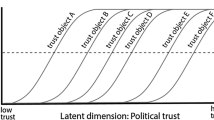Abstract
Political efficacy and trust—among the most frequently used survey measures of general political attitudes—are often maligned for their lack of reliability and validity. This paper reports results from the National Election Studies 1987 pilot study, which included more than thirty-five efficacy and trust items. Five attitudinal dimensions were hypothesized; four emerged clearly. One scale, internal efficacy, is especially robust; a four- to six-item scale represents a considerable improvement on existing NES measures. External efficacy is distinguished from political trust, at least when the former is measured in terms of the fairness of political procedures and outcomes rather than in terms of elite responsiveness to popular demands. Though less decisive, there also is support for dividing trust into incumbent- and regime-based components. The failure to find a similar incumbent- and regime-based distinction for external efficacy is in accord with theoretical perspectives.
Similar content being viewed by others
References
Abramson, Paul R., and Finifter, Ada W. (1981). On the meaning of political trust: New evidence from items introduced in 1978.American Journal of Political Science 25: 297–307.
Acock, Alan, Clarke, Harold D., and Stewart, Marianne C. (1985). A new model for old measures: A covariance structure analysis of political efficacy.Journal of Politics 47: 1062–1084.
Almond, Gariel A., and Verba, Sidney (1963).The Civic Culture: Political Attitudes and Democracy in Five Nations. Princeton: Princeton University Press.
Balch, George I. (1974). Multiple indicators in survey research: The concept “sense of political efficacy.”Political Methodology 1: 1–43.
Campbell, Angus, Gurin, Gerald, and Miller, Warren E. (1954).The Voter Decides. Evanston, IL: Row, Peterson.
Citrin, Jack (1974). Comment: The political relevance of trust in government.American Political Science Review 68: 973–988.
Citrin, Jack, and Green, Donald Philip (1986). Presidential leadership and the resurgence of trust in government.British Journal of Political Science 16: 431–453.
Clarke, Harold D., and Acock, Alan C. (1989). National elections and political attitudes.British Journal of Political Science, forthcoming.
Converse, Philip E. (1972). Change in the American electorate. In Angus Campbell and Philip E. Converse (eds.),The Human Meaning of Social Change, pp. 263–337. New York: Russell Sage Foundation.
Craig, Stephen C. (1979). Efficacy, trust, and political behavior: An attempt to resolve a lingering conceptual dilemma.American Politics Quarterly 7: 25–239.
Craig, Stephen C., and Maggiotto, Michael A. (1982). Measuring political efficacy.Political Methodology 8: 85–109.
Easton, David (1975). A re-assessment of the concept of political support.British Journal of Political Science 5: 435–457.
Feldman, Stanley (1983). The measurement and meaning of trust in government.Political Methodology 9: 341–354.
Gamson, William A. (1968).Power and Discontent.Homewood, IL:Dorsey.
Hill, David B. (1981). Attitude generalization and the measurement of trust in American leadership.Political Behavior 3: 257–270.
Hill, Kim Quaile (1982). Retest reliability for trust in government and governmental responsiveness measures: A research note.Political Methodology 8: 33–46.
Huntington, Samuel P. (1976). The democratic distemper. In Nathan Glazer and Irving Kristol (eds.),The American Commonwealth, 1976, pp. 9–38. New York: Basic Books.
Joreskog, Karl G., and Sorbom, Dag (1984).LISREL VI. Mooresville, IN: Scientific Software, Inc.
Loewenberg, Gerhard (1971). The influence of parliamentary behavior on regime stability: Some conceptual clarifications.Comparative Politics 3: 177–200.
Madsen, Douglas (1987). Political self-efficacy tested.American Political Science Review 81: 571–581.
McClosky, Herbert, and Zaller, John (1984).The American Ethos: Public Attitudes toward Capitalism and Democracy. Cambridge, MA: Harvard University Press.
Miller, Arthur H. (1974a). Political issues and trust in government: 1964–1970.American Political Science Review 68: 951–972.
Miller, Arthur H. (1974b). Rejoinder to “comment” by Jack Citrin: Political discontent or ritualism.American Political Science Review 68: 989–1001.
Miller, Arthur H. (1979). The institutional focus of political distrust. Presented at the annual meeting of the American Political Science Association, Washington, DC.
Miller, Warren E., Miller, Arthur H., and Schneider, Edward J. (1980).American National Election Studies Data Sourcebook, 1952–1978. Cambridge, MA: Harvard University Press.
Nie, Norman H., Vera, Sidney, and Petrocik, John R. (1976).The Changing American Voter. Cambridge, MA: Harvard University Press.
Shingles, Richard D. (1988). Dimensions of subjective political efficacy and political trust: Their meaning, measurement, and significance. Presented at the annual meeting of the Midwest Political Science Association, Chicago.
Sniderman, Paul M. (1981).A Question of Loyalty. Berkeley: University of California Press.
Stokes, Donald E. (1962). Popular evaluations of government: An empirical assessment. In Harlan Cleveland and Harold D. Lasswell (eds.),Ethics and Bigness, pp. 61–72. New York: Kraus Reprint Company.
Weatherford, M. Stephen (1987). How does government performance influence political support?Political Behavior 9: 5–28.
Westholm, Anders, and Niemi, Richard G. (1986). Youth unemployment and political alienation.Youth and Society 18: 58–80.
Author information
Authors and Affiliations
Rights and permissions
About this article
Cite this article
Craig, S.C., Niemi, R.G. & Silver, G.E. Political efficacy and trust: A report on the NES pilot study items. Polit Behav 12, 289–314 (1990). https://doi.org/10.1007/BF00992337
Issue Date:
DOI: https://doi.org/10.1007/BF00992337




